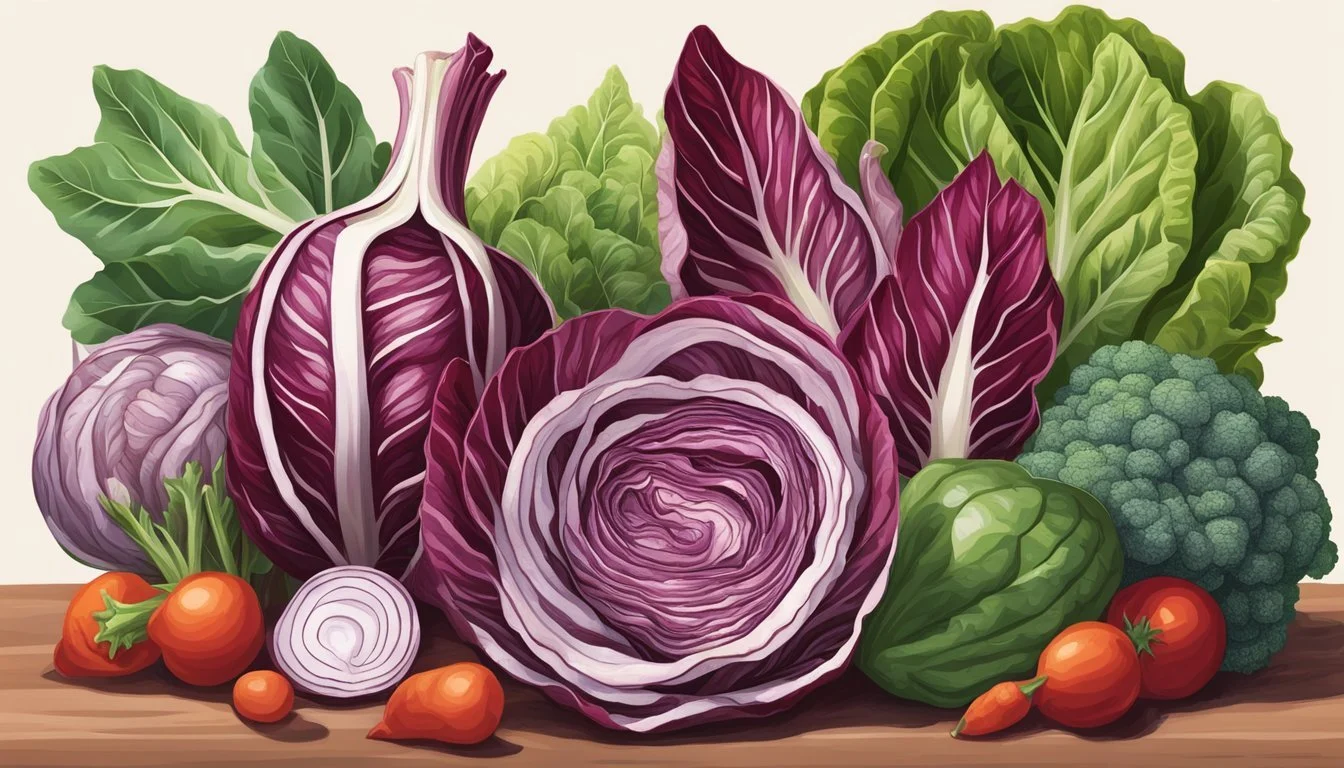What Are the Health Benefits of Radicchio?
Unveiling Nutritional Values
Radicchio, recognized for its striking reddish-purple leaves with contrasting white veins, is more than just an appealing addition to a salad. This leafy vegetable belongs to the chicory family and comes packed with a multitude of health benefits. It's a low-calorie, fat-free food that's also low in sodium, making it a valuable addition to any diet, particularly for those monitoring their caloric intake.
Rich in vitamins, minerals, and antioxidants, radicchio contributes to overall health by providing essential nutrients without adding excess calories. Antioxidants present in this vegetable, such as anthocyanins, play a role in combating oxidative stress and may have cancer-fighting properties. Moreover, radicchio is known for its high content of Vitamin K, which is crucial for bone health and blood clotting processes.
Beyond the physical benefits, this leafy chicory also supports digestion, thanks to its inulin content, a type of fiber that encourages healthy gut bacteria growth. Its phytonutrient composition is recognized for supporting a healthy immune system, while some suggest that radicchio has properties that can calm the mind and even aid in treating sleep disturbances like insomnia. Overall, incorporating radicchio into one's diet can contribute to a strong and balanced nutritional regimen.
Nutritional Profile of Radicchio
Radicchio, known for its vibrant purple leaves, not only adds a pop of color to salads but also contributes a wealth of nutrients. This section uncovers the vital vitamins and minerals it offers, along with its macronutrient content.
Vitamins and Minerals
Radicchio is a notable source of several vitamins and minerals, crucial for maintaining good health. It is particularly rich in vitamin K, which is essential for blood clotting and bone health. A single cup of raw radicchio can provide a substantial amount of this vitamin. The vegetable also contains vitamin C, a vital antioxidant that supports the immune system, skin health, and tissue repair. A host of other minerals are present in radicchio, including:
Potassium: Important for cardiovascular health and blood pressure regulation.
Calcium: Essential for strong bones and teeth.
Magnesium: Plays a role in over 300 enzymatic reactions in the body.
Phosphorus: Assists in the formation of bones and teeth and helps in energy metabolism.
Copper and Zinc: Trace minerals important for immune function, brain health, and maintenance of healthy connective tissues.
Iron: Critical for the transport of oxygen in the blood.
In addition to these, radicchio contains minor amounts of vitamin E and vitamin B6, both of which contribute to the protection of cells from oxidative stress and the proper functioning of the body's metabolism, respectively.
Calorie and Macronutrient Content
When it comes to macronutrients, radicchio is low in calories, making it an excellent choice for those looking to maintain or lose weight. Here's a brief snapshot of its macronutrient composition per one cup of shredded raw radicchio:
Calories: Approximately 9.2
Protein: Roughly 0.6 grams, contributing to muscle maintenance and growth.
Fat: A mere 0.1 grams, with radicchio virtually free of saturated and trans fats.
Carbohydrates: About 1.8 grams, with a portion of this being dietary fiber, which aids digestion and can help in maintaining a healthy gut.
The low sugar content in radicchio also makes it a beneficial addition to the diet, as it minimizes spikes in blood sugar levels, while the fiber helps in the feeling of fullness and can reduce the overall caloric intake.
Health Benefits of Radicchio
Radicchio, a leafy vegetable with a bold presence in salads, is not only vibrant in color but also rich in nutrients. With its myriad health benefits, radicchio contributes positively to bone health, cardiovascular support, and possesses strong antioxidant properties.
Antioxidant Properties
Radicchio is abundant in antioxidants such as vitamin C, lutein, zeaxanthin, and phenolic compounds. These substances play a crucial role in neutralizing free radicals, minimizing oxidative stress, and potentially reducing the risk of cancer. Regular consumption of radicchio can help the body combat inflammation and maintain cellular health.
Bone Health
This vegetable is an excellent source of vitamin K, essential for bone mineralization and maintaining healthy bones. Consuming radicchio may aid in preventing osteoporosis by contributing to better bone health. It is also rich in calcium and contains iron, which are vital minerals for bone strength and density.
Cardiovascular Support
Radicchio's high content of potassium contributes to balanced blood pressure, which is beneficial for the heart. Potassium can help regulate the contraction and expansion of arteries, reducing the strain on the cardiovascular system. Moreover, its low levels of fat and sodium make it a heart-friendly choice for those looking to prevent heart disease. Integrating radicchio into one's diet can support a robust cardiovascular system.
Culinary Uses of Radicchio
Radicchio, known for its vivid purple leaves and distinctive bitter taste, is a versatile ingredient in Mediterranean and particularly Italian cuisine. It is often used to add a pop of color and flavor to salads and various dishes.
Incorporating Radicchio Into Meals
Radicchio can be used fresh in salads, where its bright color and crisp, bitter leaves create a contrast with other salad ingredients. For a classic Italian salad, combine it with endive and arugula, then dress with olive oil and balsamic vinegar. Enhancing its flavor profile in cooked dishes is also a great option—it can be grilled, which mellows its bitterness, or added to pasta and soups for depth. Utilizing radicchio in recipes adds not only a distinct taste but also a splash of color.
Salad: Toss with lettuce and vinaigrette for a simple side.
Grill: Halve and brush with olive oil, grill until slightly charred.
Pasta: Chop and incorporate in pasta dishes for a bitter counterpoint.
Soup: Mix in towards the end of cooking to retain texture and flavor.
Storing and Selecting Radicchio
When selecting radicchio, look for heads that are firm to the touch with no signs of browning or soft leaves, which can indicate age or poor handling. Fresh radicchio should have a bright purple color with prominent white veins. To store, keep it in the refrigerator in a plastic bag or wrapped in paper towels to absorb excess moisture. Properly stored, it can last for about a week. It should be noted that the bitter taste of radicchio can intensify when it begins to go bad.
Frequently Asked Questions
Radicchio, a leafy vegetable recognized for its unique color and taste, also offers multiple health benefits. This section addresses common inquiries regarding its nutritional impact and advantages.
What nutritional benefits does radicchio provide when included in a salad?
When added to a salad, radicchio contributes significantly to daily vitamin K intake, essential for bone health. Its fiber content aids digestion, and antioxidants present in the leaves help combat oxidative stress.
How does the consumption of radicchio leaves impact health?
Regular consumption of radicchio leaves can boost overall health by providing vitamins, minerals, and antioxidants. These nutrients support the immune system, protect against certain diseases, and promote a healthy inflammatory response.
Can consuming radicchio improve kidney function?
Although radicchio has diuretic properties that might aid in promoting kidney health, one should not solely rely on it to improve kidney function. It is part of a balanced diet that supports organ systems.
Are there any negative effects associated with eating radicchio?
Eating radicchio is generally safe for the majority. However, individuals on blood-thinning medications should monitor their vitamin K intake, as radicchio is high in this nutrient, which can affect blood clotting.
How does radicchio compare to cabbage in terms of health benefits?
Radicchio and cabbage both contain fibers and antioxidants, but radicchio has higher levels of vitamin K and certain antioxidants like polyphenols, which may offer better support for bone health and oxidative stress management.
Does radicchio offer digestive health benefits?
Its dietary fiber content promotes bowel regularity and aids in maintaining a healthy digestive tract. Additionally, as part of a varied diet, it supports gut health by contributing to the overall intake of nutrients necessary for the digestive system.




